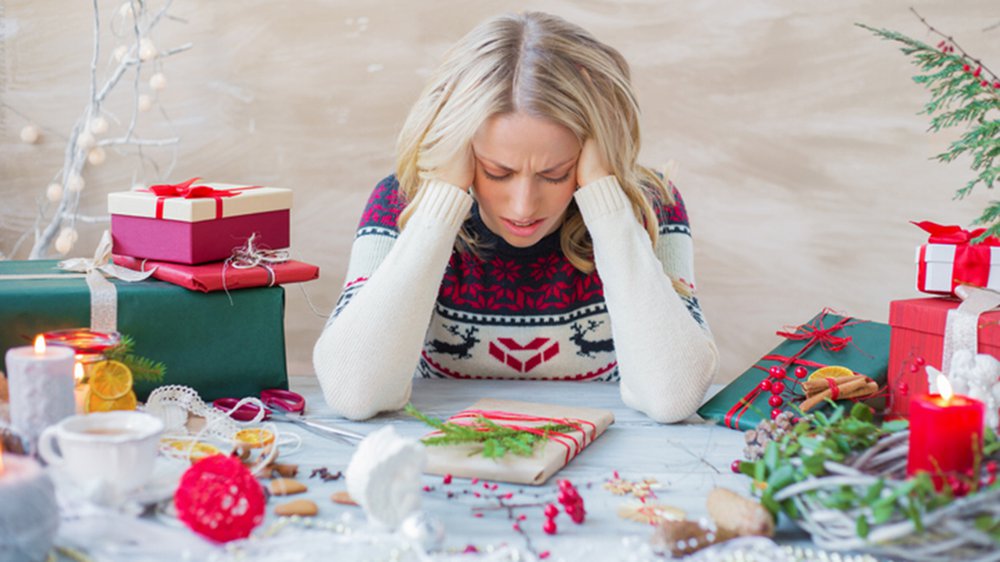Are you anxious this holiday season? The American Psychological Association indicates that in a typical year the majority of Americans find the holidays stressful. The idea of “holiday blues” or “holiday stress" -- the depression and anxiety revolving around the social and physical pressures of the season -- has been around for a long time, as evidenced by psychiatric studies and classic movies of the 1980s! This year, with the pandemic, we're more stressed than ever and the holiday season is bringing unprecedented challenges.

What is stress?
The term stress comes from physics, and indicates tension. Scientists and psychologists now use it to describe a feeling of emotional or physical tension. It’s also used to describe your body’s reaction to a challenge or demand. Stress can come from any event (real or imagined) that makes you feel frustrated, angry or nervous. In short bursts, stress can be positive, such as when it helps you avoid danger or meet a deadline. But over a prolonged period (when stress lasts for days, weeks or longer), stress can be damaging to your health.
Psychological stress can have mild to severe health consequences on many systems in your body, including the cardiovascular, skin, gut, joints and muscles, immune, reproductive and the brain/nervous system.
Stress is a normal and essential part of healthy development. We should have a small stress response to intermittent stressors like the first day of school or getting a vaccine shot. More severe stressors (like a broken bone or the loss of a loved one) will result in larger stress responses that will last longer, but should still be tolerable. Stress becomes toxic when we experience very strong, frequent or prolonged adversity, such as physical or emotional abuse.
Stress happens. Our ability to respond appropriately to stress is the key to success.
What is it about the holidays that is stressful?
Problems with stress typically develop from an imbalance between supply and demand. We don’t have enough of what we need, whether it is time, money, energy or whatever is necessary to meet the demand of the challenge. Why is X stressing you out? Because you don’t have, or have limited amounts of, Y to deal with it.
During the holidays, you’re trying to do more with less. You’re adding extra social events to an already full calendar (it may be 2020 but all those Zoom gatherings still count!). You’re increasing purchases, contributing to an already strained budget. You’re adding extra home decorations to be festive. You’re trying to cook more, clean more, spend time planning, shopping, wrapping and engaging in traditions with your family. How are you going to do it all? Of course you are anxious!
Managing stress is a crucial part of how we will all get through this holiday season dominated by the pandemic. Adding yoga and meditation to your daily routine are great ways to reduce stress.
Are there some common stressors?
It might help to categorize your stressors. Then we can take that huge laundry list of things that are bothering you and sort them into four categories with clear coping strategies for each.
Dr. Karl Albrecht published his book, Stress and the Manager, in 1979. While this information has been around a long time, most of the stressors he identified can still fit into these four types: anticipatory, time, situation and encounters. Even if heightened during the holidays, these stresses are around all year round, so we’ll think about how to process them over the year.
Anticipatory stress refers to the worrying we do either about a specific future event or a more general vague sense of dread. Coping strategies include positive visualization techniques (imagine things going right -- your neural networks will remember this!), meditation (focus on now), confidence-boosting activities and making contingency plans to diminish your fear of failure and gain a sense of control.
Encounter stress revolves around people. We might have to deal with people we don’t like or who are unpredictable, or those who are in distress. Healthcare professionals, for example, have high rates of encounter stress as they spend their days with people who don’t feel well. Beyond that, sometimes we have contact overload and get drained from interacting with too many people. Coping with encounter stress may require you to take a break from people, take a quick walk, grab a drink of water or practice deep breathing. If this is an area of common stress for you, spending time learning more about emotional intelligence and interpersonal communication strategies could help.
Situational stress happens in a circumstance you aren’t prepared to deal with, and often arises suddenly, like when you get called on in a meeting you were quietly attending or a family gathering erupts into an argument. Your automatic response is a surge of anxiety and you don’t quite know what to say. Coping with this kind of stress means spending time learning effective conflict resolution skills and emotional management. In the moment, though, come up with a few catch phrases to buy yourself a little extra thinking time to calm down.
Time stress is incredibly common. We often don’t allow enough time to complete the list of tasks we have to do, and/or we take on too much. Coping strategies for this stressor include working on time management practices and prioritization. Make a list and check it twice!
Now that you better understand the science of stressors, and can hopefully identify where they are amplified in your life during the holidays, you can try to look for ways to manage the supply and demand to make the season and this year a little more relaxing and enjoyable. Here's to happy, healthy and stress-free holidays!
The Museum is hard at work helping you to discover your world despite dramatically reduced financial resources. If you'd like to help us continue this work, click here to learn how.


